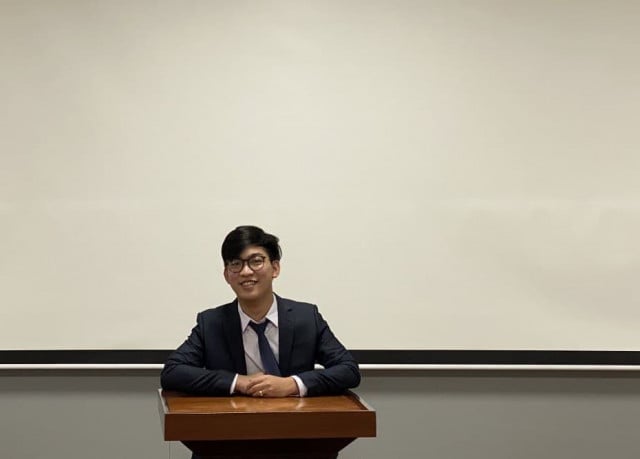Laws Catching up with Technology: a Law Student Shares his Thoughts on the Challenges This Might Represent for Cambodia

- By Ky Chamna
- September 12, 2021 6:38 PM
With technology having become part of everyday life for a large segment of the general public, new legal boundaries will be needed to demarcate what is and is not allowed, and when gathering data on individual or business users turn into intrusion.
Kouch Oudomvichea is a senior law student at the American University of Phnom Penh (AUPP). In 2020 and 2021, he was part of the team of five students who represented AUPP in the Philip C. Jessup International Law Moot Court competition in which 550 law schools from 90 nations took part.
He shares his views on the challenges artificial intelligence and computer technology may represent for Cambodia in terms of laws and regulations.
Ky Chamna: With the swift pace of technology especially in the field of social media such as TikTok, Facebook or Telegram, how does legislation in Cambodia keep up with this in order to make our society both safe and progressive?
Kouch Oudomvichea: In this age, information can be accessed at the tip of our fingers. It goes very fast and, whether it is true or not, it is shared and contributed all over the place. From what I have seen, I can say that what Cambodia has been doing is filtering out contents of fake news and encourage people or users to be more responsible for it. I also think that, while this technology is heading forward at a very quick pace, it is not solely the responsibility of the government. It is also the responsibility of people to be mindful of where the sources of information originate from. Therefore, in a way, it is a dual responsibility between people and government.
Ky Chamna: Do you think it is hard for the law sector in Cambodia to keep up with the advancement of technology that is flowing or will flow into the country? And why?
Kouch Oudomvichea: For me, I would consider that it is hard. However, it is not complicated to the point that we could not adopt anything to combat it. To make a transition into something new, things do not just happen overnight. It may take years and years. First thing first: We need to understand the social context of the advancement of technology in Cambodia. What we need to do is raising the awareness of this technological advancement. It definitely is hard since the majority of people in Cambodia does not have internet. On top of that, quite a number of people do not really understand the internet. Therefore, as a first step to embrace these new changes, perhaps the implementation of technology literacy could help. As for the law sector, Cambodia is still relatively new in terms of legislation on this very topic. We have been working hard to keep up and catch up with what have been missing.
Ky Chamna: With Artificial Intelligence (AI) and self-driving vehicles—Tesla car being one of the prime examples—both generally and specifically speaking, how will Cambodian traffic laws govern cars, which are driven by computers and algorithms instead of human beings?
Kouch Oudomvichea: I think it is not hard to pinpoint who is responsible for those self-driving vehicles. For example, although the vehicles function under the system or mode of self-driving, there are still people behind the steering wheel. Therefore, in a sense, it is not really functioning under the mode of self-driving. As for AI, its very aspect is still new within the boundaries of Cambodia. Because of it being so new, we still need to see what are the problems that may arise and originate from it. From there, we would tailor our laws to regulate, minimize or wholly eliminate. The topic of AI is interesting. For example, we can think of AI as a legal assistant. Let’s say, what if in the future, people can create an AI that could help people gain more access to the justice system? The least AI could do is probably to save a whole lot of time on legal research. This could change the whole game in law. We all know how people do not have the same and equal access. To mention one example: Operating justice based on socioeconomic status can be helped, through the intervention of AI, in order to bridge the gap.
Ky Chamna: While technologies such as online news, electronic banking or social media are developing quickly in Cambodia, based on your own ideas, which Cambodian laws need to be amended soon in order to stay up to date with these technological trends?
Kouch Oudomvichea: The important and essential asset for these technologies to work is our data. Our data is expensive right now, and people are not aware of it. Hence, broadly any laws that are related to data would be important. To have a law drafted is already one complicated and time-consuming problem to overcome. Furthermore, enforcing those laws is another level to undertake. The system requires a lot of resources to put one law in place. Since the idea of technology is new, it could take a whole structural reform and various new principles for the laws to be executed.
Ky Chamna: At this time, are there enough law experts in Cambodia who understand well the relationship between law and new technologies? And do you think Cambodia will need more expert in this field in the near future? And why?
Kouch Oudomvichea: Cambodia, for sure, will need more experts. Drafting a new law is a long and tedious process. On top of that, many factors may have to be taken into consideration. To have more and more people understand the link and the relationship between law and new technologies will so much contribute to seeing the problems from different angles and perspectives. Plus, the technology will not stop developing. We will continue learning and adapting to this new way of living. Which means that, once the law is published, it will take people to monitor and to keep up with the challenges of enforcement. Therefore, it is always a good idea to have as many experts as possible to serve as valuable human resource for Cambodia.















